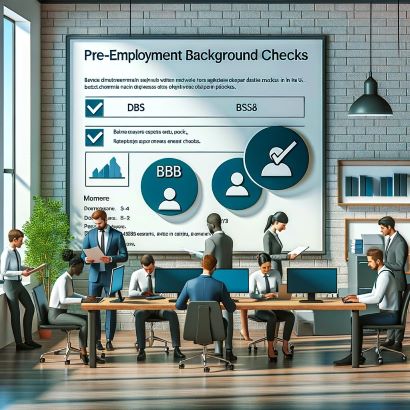

This transparency helps maintain trust between the employer and the employee, and ensures that the process is viewed as legitimate and fair. Some organizations may stipulate more frequent renewals based on their internal policies. speed up your recruitment process using bpss clearance services that are fast , accurate and affordable. Each document serves as a puzzle piece in the larger picture of your suitability.
BPSS checks typically include four main elements: identity verification, employment history check, right to work confirmation, and a basic criminal record check. The role of BPSS clearance in maintaining public trust cannot be overstated.
Social workers dealing with sensitive cases, such as child protection or mental health issues, need BPSS clearance to ensure they handle such vulnerable information with the utmost integrity and confidentiality. This requirement aims to evaluate your movements and assess potential risks associated with overseas stays.
Some organizations may mandate more frequent renewals based on internal policies.4. A criminal record check is conducted to ascertain if the individual has any convictions that might be relevant to their suitability for the position.
It ensures that individuals handling classified information or involved in security-sensitive activities are appropriately vetted and continuously monitored throughout their employment. Enhanced technological advancements are shaping the future landscape of BPSS compliance, offering quicker and more accurate identity verification processes. This step is essential not only for legal compliance but also for ensuring the reliability of the workforce in sensitive or security-related roles. Employment law
BPSS does not have a formal ongoing monitoring or renewal policy; it is primarily conducted at the time of hiring. Each of these areas is carefully examined to ensure that the individual does not pose a security risk.
When comparing BPSS checks to other screening processes, it becomes evident that BPSS focuses specifically on verifying identity, right to work status, criminal records, and employment history. BPSS is essential for roles accessing sensitive government assets, whereas DBS is commonly used in sectors like healthcare and education.
Providing evidence of at least three years of employment history is an important requirement for BPSS clearance. This step must be done in person or, following recent updates, via online checks using the Home Office's online right to work checking service, which provides real-time information about the entitlements of potential employees.
Follow our guide to apply for BPSS clearance successfully.

Posted by Jasmine Roberts on 2024-10-08
Keep your BPSS clearance active with proper renewals.

Posted by Jasmine Roberts on 2024-06-24
Learn how BPSS clearance protects government data.

Posted by Jasmine Roberts on 2024-06-14
This process is crucial in safeguarding the nation's security infrastructure and upholding public safety standards. Providing a valid passport or driver's license is essential for verifying your identity when applying for BPSS clearance. They work in environments with young and vulnerable individuals and must ensure a safe and secure educational setting.
By ensuring that employees do not have harmful criminal backgrounds, organizations can maintain a safe and secure working environment. However, it also necessitates stringent measures to guard against potential cybersecurity risks.
Therefore, full disclosure and honesty regarding any unspent criminal records are crucial steps in the BPSS application process. It's essential to provide accurate information and meet the trustworthiness standards to pass the screening process.
These documents serve as primary forms of identification and are vital in confirming who you are. This includes various roles within the public sector, such as in defense, health services, and law enforcement.

The clearance is essential to safeguard national security and operational integrity within the armed forces. The process of obtaining BPSS clearance includes a detailed review of the applicant's identity documents, such as passports or driver's licenses. While BPSS itself is not mandated by specific laws, it operates under the broader legal and regulatory framework that governs national security and employment practices in the UK.
Additionally, Security Check (SC) and Counter-Terrorist Check (CTC) clearances offer access to more classified data than BPSS, making them essential for roles with heightened security requirements. Reviewing a candidate's employment history is another vital component of the BPSS checks.
BPSS checks are typically required for individuals working in, or on behalf of, the UK government. BPSS form However, delving into the specifics of unspent criminal records and time spent abroad might hold the key to your successful clearance.
Here's what you need to know:Valid documents such as a passport or a Home Office document are required to prove your national and immigration status. Baseline Personnel Security Standard (BPSS) clearance is a fundamental security check within the UK, primarily designed to prevent individuals who may pose a threat to national security from gaining access to government and sensitive information.

However, BS7858:2019 also outlines specific storage and handling procedures for the sensitive information gathered during the vetting process, reflecting its more rigorous data collection. BPSS checks are generally conducted as a one-time check prior to employment to establish a baseline of trust and security clearance. It helps prevent the employment of individuals who might have restrictions that could impact their suitability for specific duties.
Illegal workers may pose a security risk as they might have circumvented the usual checks and processes designed to protect sensitive information and environments. These policies should outline the steps to be taken if a potential security threat is identified during the BPSS process, including how to manage and mitigate such risks appropriately.
In conclusion, BPSS clearance is an essential component of the security framework within many organizations, particularly those involved with the UK government or national security. One key consideration in this process is the disclosure of any unspent criminal records.
Once an individual has been vetted, their information can be continuously checked against updated databases for any changes that might affect their security status, such as new criminal records or changes in financial status, ensuring ongoing compliance with security standards. Verifying identity and right to work involves checks against databases and sometimes contacting issuing authorities, especially if there are concerns over the authenticity of the documents.


From a security perspective, the right to work check is foundational in the BPSS process because it ensures that individuals are not only legally employed but also properly vetted. The identity verification process is a crucial part of BPSS checks. While the typical duration for a BPSS check ranges from two weeks to a month, it's important for both employers and candidates to be prepared for variations based on the factors discussed.
What Is in a BPSS Check? This information is critical in assessing whether an individual might pose a risk to national security or the safety of the public.
As the future of BPSS compliance evolves, staying up to date with the process and maintaining valid clearance is vital for individuals in sensitive positions. It requires individuals to provide valid, government-issued identification documents, such as a passport or driver's license.
Hence, BPSS checks are an essential aspect of security practices for entities associated with the UK government. Identity checks are essential, requiring verification through official documents to confirm personal details.
Organizations that fail to properly conduct BPSS clearance may face significant risks, including security breaches and legal consequences. Criminal Records Check: Verification of any unspent criminal records is crucial for evaluating suitability for BPSS clearance. This process not only supports the legal operation of businesses but also protects against potential security risks associated with unauthorized employment.
In conclusion, the right to work check is a fundamental part of BPSS checks in the UK, ensuring legal compliance and upholding high security standards within organizations.

BPSS vetting includes checking identity details such as name, address, and date of birth, along with employment history, criminal record, and legal right-to-work status.